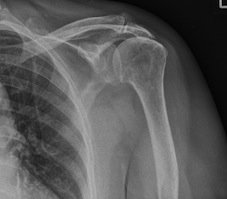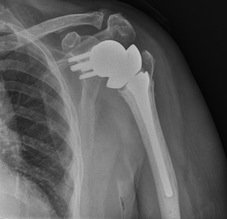Indications for operation
Rotator Cuff Tear Arthropathy causing pain which has not responded to conservative treatment
Frequently Asked Questions
Anaesthetic
General Anaesthetic with an interscalene block (You will be fully asleep and a local anaesthetic injection into the side of the neck will numb the nerves to the shoulder for post-operative pain relief)
Operation type
Open
Incisions
An 8cm incision will be made in the front of the shoulder in the “deltopectoral groove”. This runs from just below the clavicle “collar bone” straight down towards the axilla (armpit).
Procedure
The muscles over the front of the shoulder will be pulled to the side and the subscapularis muscle will be divided to allow access to the joint. The head of the humerus (arm bone) will be shaped and the bone prepared to receive the implant. The face of the glenoid (the body side of the joint) will also be prepared to receive a new surface.
The Reverse shoulder replacement is different from a standard shoulder replacement in the that the ball is on the socket side and the socket is on the ball side. This is designed to compensate for the lack of rotator cuff muscles.
The new shoulder joint will be inserted and fixed into place.
The tissues will be sewn back to their original positions.
A small vacuum drain may be inserted into the joint to allow any blood which collects after the operation to be removed.
There are several different types of shoulder replacement. The DJO RSP arthroplasty is used routinely by the partners.

